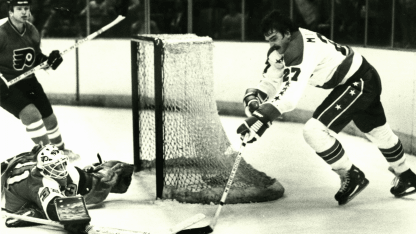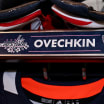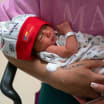Mention the name Paul Mulvey and it immediately conjures images of a darker side of hockey that most would sooner forget. The burly 6'4" 225-pound right winger was at the centre of one of the NHL's biggest controversies in league history back in 1982. It was a black mark which effectively ended his playing career. Although he played 225 games in the NHL, and was widely known for his fighting abilities, it was his infamous non-fight that remains his permanent legacy, unfair as it may be.
Caps Alumni Biographies: Paul Mulvey
Mulvey was selected in the second round, 20th overall in the 1978 NHL Amateur Draft by the NHL Washington Capitals.

Mulvey played his minor hockey in Merritt, British Columbia in the late 1960's and early 1970's and was actually a goaltender in his younger days. He's convinced that's because of the influence and prodding of his older brother Grant, who "needed someone for shooting practice." The training obviously paid off for his big brother, who also made it to the NHL, playing nine years with the Chicago Blackhawks and a handful of games with the New Jersey Devils. Younger brother Paul had since moved from the nets and into a forward position and joined the Edmonton Oil Kings of the WCJHL in 1974-75 at the age of 17.
He had already established himself as a rugged sort who took full advantage of his large frame to intimidate opposing players. In his second year with the Oil Kings Mulvey spent 331 minutes in the penalty box while also contributing offensively with 67 points. He was traded to the Portland Winter Hawks for the start of the 1976-77 campaign, and he played there for two years. He was a model of consistency, scoring 43 goals both years surpassing 250 minutes in penalties. Mulvey's rough, aggressive style combined with a knack for putting the puck in the net was an intriguing combination for many NHL scouts.
Mulvey was selected in the second round, 20th overall in the 1978 NHL Amateur Draft by the NHL Washington Capitals. He played three somewhat uneventful years with the Capitals, and was clearly designated as one of the team's main enforcers where he was known to give and receive a good number of bruising punches. He joined the Pittsburgh Penguins in 1981-82 as a compensation for the Capitals obtaining restricted free agent Orest Kindrachuk from the Pens. The stint in Pittsburgh lasted just 27 games before Mulvey was given his release. On December 30, 1981 he was claimed on waivers by the Los Angeles Kings.
The fateful game which forever changed Mulvey's life in hockey occurred in just his eleventh game in a Kings uniform. It was January 24, 1982 and a second-period on-ice brawl erupted during a game between the Kings and Canucks in Vancouver. When Vancouver's Tiger Williams broke loose from a linesman and rejoined the fracas, Kings coach Don Perry hit Mulvey on the back and said "Go out there and don't dance" a phrase which Mulvey said meant go out there and hurt someone badly. But Mulvey didn't move from his spot on the bench. Perry exhorted him again, and a third time, but to no avail. It was about 30 seconds later, after a Canucks' player jumped over the boards, which essentially started a bench-clearing brawl, when Mulvey elected to follow fellow teammates Rick Chartraw and Mark Hardy onto the ice and into the melee, which by then was well past its heated climax. "I don't want to be known as a designated assassin," Mulvey stated afterwards, explaining his refusal to get involved in the altercation.
During the second intermission coach Perry was loudly heard chastising Mulvey in the dressing room and after the game furiously stated "I don't want a player on my team that won't stick up for his mates." Mulvey was immediately placed on waivers and after clearing all the other NHL clubs, was demoted to the Kings' AHL affiliate in New Haven. It was there that he was told if he "kept his nose clean and followed coaching orders" he would be able to return to the NHL. Mulvey was convinced he had been blacklisted, not only by the Kings but by the NHL as a whole. He was traded to the Edmonton Oilers in June, 1982, but never played with the team. He retired after the 1982-83 season while with the AHL's Moncton Alpines.
In 1984, still very angry at what he perceived to be blatant blacklisting, he launched a $20 million lawsuit against the Kings and a settlement was eventually reached. "It's not that I was sitting there and wouldn't start this bench-clearing brawl," Mulvey noted. "It was the fact I was sitting there and wouldn't start this bench-clearing brawl." Coach Perry was handed a 15-day suspension for ordering a player off the bench to fight and the team was given a $5,000 fine by the NHL president John Ziegler. But Mulvey got an unofficial lifetime ban. He was viewed as an enforcer who would not protect his teammates, and that was a major issue, although Mulvey has often stated that mantra is very unfair. "Nothing was going on that was out of control," Mulvey said of the now infamous game. "If a player had been getting severely hurt I would have been the first off the bench to help."
Since leaving hockey as a player almost 20 years ago, Mulvey and his family have lived in Reston, Virginia. He now serves as the head coach of the Reston Raiders.
Player bios courtesy of the Hockey Hall of Fame


















